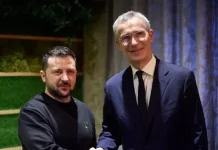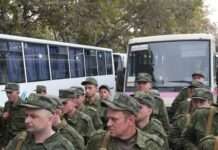Volodymyr Struk was a pro-Russian, he served in the southeastern province of Luhansk as a lawmaker with Ukraine’s main pro-Russian party – Party of Regions.
Last year, he went to Kreminna, a rebel-held town of 18,000 people two hours northwest of Luhansk, and was elected mayor on 25 October, 2020 until his death.
As part of a fresh attack in eastern Ukraine, Russian soldiers captured the town.
On March 2, Anton Herashchenko, an advisor to Ukraine’s interior minister, stated on Telegram, “the entire state apparatus of Ukraine – the SBU [intelligence service], the Interior Ministry, prosecutors, courts – could not do anything with the openly separatist Struk for eight years because he had a lot of money, most likely support from the Russian Federation.”
Herashchenko stated of Struk’s death that he was “executed as a traitor by unknown patriots.”
He also posted a photo of Struk’s remains.
The balding 57-year-old boldly donned a forbidden pro-Moscow sign, a black-and-orange ribbon, while facing two arrest warrants.
Struk had remarked just days before his death that the Russian invaders were welcomed in Kreminna.
Later, on March 1, his body was discovered following his kidnap from his home by an unknown individuals in camouflage.
The Russian-speaking regions of coal mines, steel factories and chemical plants residents were accustomed to Soviet-era privileges such as free healthcare and education, and now feel alienated by Ukraine’s cash-strapped central government.
According to a witness, “centrist” Ukrainian parties were unable to meet the demands of the people, thus “oligarchic” forces like the Party of Regions and its political heirs stepped in to fill the void.
Sergey Vaganov, a 63-year-old retired photographer from Mariupol, told Al Jazeera: “Our electorate is pro-Russian.” “No major Ukrainian party even tried to work here, honestly. No one was fighting for the voters.”
Mariupol, the Donetsk region’s southernmost city, was temporarily held by separatists in 2014, and when Ukraine reclaimed control, it became the region’s de-facto administrative capital.
However, Ukraine failed to capture hearts and minds.
Voter participation is often low across Ukraine, owing to widespread apathy, and older, Soviet-born Ukrainians are among the most active voters; their ballots drove Struk to the mayor’s seat.
The Donbas separatists watch Russian television broadcasts and the Russian border is only a few hours away from practically anyplace in Donbas; many people have family and acquaintances on the other side.
Moreover, Ihor Saldyha, a 38-year-old Kharkiv resident who lives 40 kilometers (25 miles) from the Russian border, claimed some of the older people he encounters on the besieged city’s streets remain pro-Russian.
He claims that only Russian bombing will persuade them to change their minds.
He said, “when someone gets an incoming [shell] in his house, in his back yard – they all of a sudden begin to understand things.” A Donetsk community activist agrees with his remarks.
Nadia Gordiuk, a resident of New York’s southeastern hamlet, which is close to separatist strongholds, said “Putin did really enlighten some with his bombings.” “The least hopeless ones.”
With the exception of Kreminna, four other town mayors in Ukrainian-controlled Luhansk have defected, according to regional governor Serhiy Haidai.
He stated in televised remarks, “after our victory, we will see how the laws on collaborating with the enemy will work on these people.”
For the time being, they can leak information on the positions of Ukrainian personnel, military, and fuel storage, as well as push others to participate, amid the renewed eastern Russian offensive named “The Battle of Donbas.”
Furthermore, they repeat the Kremlin’s assertions that President Volodymyr Zelenskyy’s pro-Western administration is attempting a “genocide” of Russian-speaking Ukrainians.
“I was shocked by the genocide towards us on the part of the Ukrainian Nazism,” Serhiy Khortiv, the mayor of Rubizhne, stated in a YouTube video uploaded in early April.
He yelled to the government, “you are fascists, Europe and America spawned you, and you dance and sing for their money on our blood.”
Khortiv may face up to ten years in prison, according to the General Prosecutor’s Office, for “entering into a criminal conspiracy” with Russia and separatists.
KEEP READING:
- Why Russia Is Focused On Taking Control Of Donbas
- Putin Says Western Sanctions Placed On Russia Have Backfired
SOURCE: ALJAZEERA & NEWS AGENCIES








